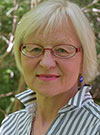Tuija Hilding-Rydevik

Presentation
Since 2011 Tuija Hilding-Rydevik is the Director of the Swedish Biodiversity Center (CBM). CBM is governed jointly by SLU and Uppsala University. Tuija Hilding-Rydevik is also appointed by the Environmental minister as a member of the scientific committee Swedish National Council for Nuclear Waste, that is to advice the government on finding a safe final disposal for spent nuclear fuel (www.karnavfallsradet.se). She is also a member of the national scientific committee for Biodiversity and Ecosystem services hosted by the Swedish Environmental Protection Agency. The committee is to support SEPA in the Swedish international workrelated to the Intergovernmental Panel on Biodiversity and Ecosystem Services (IPBES).
Research
Research focus
Main research focus is on the practically crucial, but not enough investigated, issues of environmental policy integration and implementation in different public administrations. This knowledge can serve as a basis for more effective environmental policy implementation and pace up the public administration contribution to sustainable development.
Areas included in this research is e.g. conservation and biodiversity, land use planning, regional economic planning, energy planning, processes for planning for final disposal of spent nuclear fuel in Sweden Nordic countries and EU.
The research focuses are mainly on the micro level and socio-cultural learning and change conditions for planning officials at international, national, regional and local level. Part of the research also concerns how and if policy instruments like environmental impact assessment (EIA, SEA), indicators etc. works in practice and how and if they are helpful in these implementation processes. In general there exists in research and in practice a need for better understanding of these micro level policy implementation processes in different contexts in relation to sustainable development, environmental and conservation policy goals.
The questions we need to know more about is: what happens in the day-to-day professional work when environmental policy is to be implemented? How do the professionals make policy goals operational? What conditions exist for them to change and learn new perspectives, apply new tools etc related to sustainability goals? How accurate and helpful is the design of national policy for the practical implementation? To understand the interplay and relation between sustainability, environmental and conservation policy formulation and the conditions for policy implementation is crucial in order to improve policy formulation and implementation practice.
Examples of recent research projects
Ways forward, for a selection of national government public administrations, for their implementation of the Convention on biodiversity (CBD) and the role of local and traditional knowledge of relevance for biodiversity. Funded by the Swedish Environmental Protection Agency .Transformational learning and sustainable energy use (TRANSFORM). Funded by the Swedish Energy Board.Communities of practice – the case of the Swedish planning and decision making process for final disposal of spent nuclear fuel (GRAN). Funded by Formas.Implementing Sustainable Development in Regional Development Projects - practical measures and socio-cultural conditions (HUR). Funded by Mistra.Alternatives in Strategic Environmental Assessment. Funded by the Swedish Environmental Protection Agency.
Background
Tuija Hilding-Rydevik got her PhD degree in 1990 at the Royal Institute
of Technology (KTH), Stockholm, with the first Swedish PhD thesis
focusing EIA and SEA (Strategic Environmental Assessment). She continued
as an assistant professor at KTH and was appointed to associate
professor in 1997 based on her work at KTH. Thereafter Tuija
Hilding-Rydevik worked as a research secretary at the Swedish
governmental and national research funding organization Swedish Council
for Planning and Coordination or Research (FRN).Then followed by a
Senior Researcher position at the Nordic research institute Nordic
Centre for Spatial Development (Nordregio) under the Nordic Council of
Ministers. In 2006 Tuija Hilding-Rydevik got a position as Senior
Lecturer in EnvironmentalAssessment [miljökonsekvensbeskrivning] at the
Swedish EIA Centre, Department of Urban and Rural Development, SLU.
Tuija Hilding-Rydevik was promoted to professor in Environmental
Assessment in December 2013.
Selected publications
Selection of publications
Cashmore, M, Richardson, T, Hilding-Rydevik, T & Emmelin, L (2010) Evaluating the effectiveness of impact assessment instruments: Theorising the nature and implications of their political constitution. Environmental Impact Assessment Review 30 (2010) 371–379.
Bergeå, H, Hilding-Rydevik, T & Håkansson, M (2014) Learning to avoid sustainable development – the case of a Swedish Regional Economic Development body. Submitted to J. of Environmental planning and management Oct 2014.
Bodegård, J, Hilding-Rydevik, T, Wramner, P & Ebenhard, T (2012) " Nobody knows what species that are indispensible. Dagens Nyheter 2012-10-25. Swe http://www.dn.se/ledare/huvudledare/ingen-vet-vilka-arter-som-ar-oumbarliga/
Dovlén, S & Hilding-Rydevik, T (2007) Sustainable Development in Regional Development Practice: A socio-cultural view of evaluation. In: Khakee, A (Ed)(2007) New Principles in Planning Evaluation. Ashgate.
Ebenhard, T & Hilding-Rydevik, T (2013) Ecosystems and biodiversity. In: Lundgren, L (Red)(2013) The generation goal – thoughts on environmental policy and redirections of societal development. Swedish Environmental Protection Agency.
Hilding-Rydevik, T & Bjarnadóttir, H (2007) Context awareness and sensitivity in SEA implementation. Environmental Impact Assessment Review 27 (2007) 666–684
Hilding-Rydevik, T & Emmelin, L (2011) Alternatives in Impact Assessment – an empirical pilot study. Swedish Environmental Protection Agency, Dec.
Hilding-Rydevik, T & Åkerskog, A (2011) A clear case of 'doublespeak' – The Swedish Governmental SEA Implementation Discourse. J. of Environmental Planning and Management 54(4)495–515.
Hilding-Rydevik, T, Håkansson, M & Isaksson, K (2011) The Swedish Discourse on Sustainable Regional Development: Consolidating the Post-political Condition. International Planning Studies 16(2)169–187.
Kågström, M, Hilding-Rydevik, T & Sjöberg, I (2013) Human health frames in EIA: the case of Swedish road planning. J. of Project Appraisal and Impact Assessment, 31(3)198–207.
Storbjörk, S, Lähteenmäki-Smith, K & Hilding-Rydevik, T (2009) Conflict or consensus: The challenge of integrating environmental sustainability into regional development programming. European J. for Spatial Development. www.nordregio.se/en/ European-Journal-of-Spatial-Development/Refereed-articles. Apr 2009, no 34.
Tunón, H, Hilding-Rydevik, T., et al (2015). Vägar framåt för några nationella myndigheters implementering av konventionen om biologisk mångfald och lokal och traditionell kunskap av betydelse för biologisk mångfald. Avrapportering till Naturvårdsverket av uppdrag. Centrum för biologisk mångfald, SLU, Uppsala.
Wärnbäck, A., Soneryd, L., Hilding-Rydevik, T. (2013) Shared practice and the establishment of clear roles in nuclear waste management: Long-term relations between industry and the public authorities in Sweden. Environment and Planning A 2013 (45) 2212 – 2226.